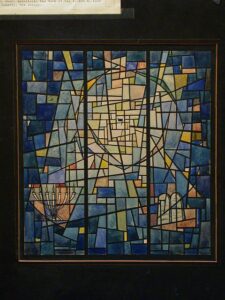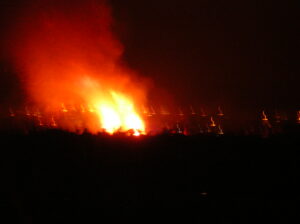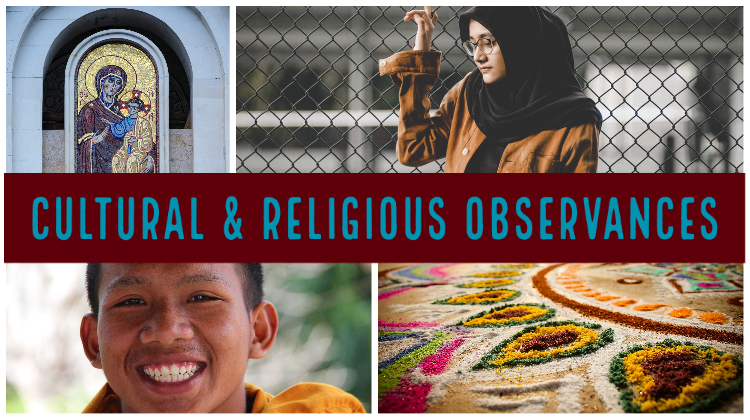Hanuman Jayanti

Culture/religion: Hindu
Date: April 26
Hanuman Jayanti is a very special festival in India celebrating the birth of Lord Hanuman. Hanuman is widely known and worshiped for his unflinching devotion to Lord Rama.
Devotees visit Hanuman temples to worship Hanuman and get his blessings. People also celebrate by chanting various devotional hymns and prayers and reading holy scriptures.
Sources:
When is hanuman Jayanti 2020? Date, History, Significance and all you need to know, Times of India
Hanuman Jayanti, Times of India
Theravada New Year

Culture/religion: Buddhist
Date: April 27-29
Theravada New Year is a Buddhist festival celebrated by followers of the Theravada religion. The celebration takes place on the first full moon day in April, marking the end of one luni-solar calendar year and the beginning of the next.
Celebrations and traditions vary by region, but many use rituals involving water and sand. Each grain of sand represents a wrongdoing, and when the sand is washed away, the bad karma is washed away as well.
Sand hills are built to symbolize Mount Meru, the mountain at the center of the cosmos and home of the gods; Buddha statues are distributed to monks; and in some regions, people pour water on each other and Buddha statues.
Sources:
Theravada New Year, Feast-Guide.com
Happy Theravada New Year, Wijsheidsweb.nl
Why do only some Buddhists celebrate Theravada New Year?, Beliefnet.com
Lag BaOmer

Culture/religion: Judaism
Date: April 30
Lag BaOmer (“33rd day in the Omer) is a festive Jewish holiday that falls on the 33rd day of the Omer – the seven-week period between Passover and Shavuot.
Lag BaOmer provides a break from the semi-mourning restrictions (no parties or events with music, no weddings, no haircuts) that are typically in place for some Jewish communities during the Omer. Many people choose this day to get married or get a haircut.
The Omer has agricultural and spiritual significance – it marks the spring cycle of planting and harvest, and the Israelites’ journey out of slavery in Egypt (Passover) and toward receiving the Torah at Mount Sinai (Shavuot).
In observance of the holiday, bonfires are lit, traditional songs are sung around bonfires and at weddings, Jewish unity and pride is demonstrated through parades and children get their first haircuts, among other ways of celebration.
Alternate names: Lag LaOmer (“33rd day of the Omer”)
Alternate spellings: Lag b’Omer
Pronunciation: LAHG BOH-mayr
Sources:
Lag BaOmer, ReformJudaism.org
Glossary of Jewish Terminology, Judaism 101, jewfaq.org
Asian Pacific American Heritage Month

Culture/religion: National observance
Date: May
Asian/Pacific American Heritage Month began with Congress in 1977 and was finalized on October 5, 1979 when president Jimmy Carter signed House Joint Resolution 1007 proposing the president proclaim a week during the first ten days of May of 1979 as Asian/Pacific American Heritage Week.
In 1990, Congress passed Public Law 101-283 which expanded the observance to a full month in May 1990, followed by the passing Public Law 102-450 in 1992 designating the Asian/Pacific American Heritage Month an annual observance
The month of May was chosen to commemorate the immigration of the first Japanese to the United States on May 7, 1843, and to mark the anniversary of the completion of the transcontinental railroad on May 10, 1869 in honor of the Chinese immigrants who laid many of the tracks.
Sources:
Jewish American Heritage Month
 Culture/religion: National observance
Culture/religion: National observance
Date: May
On April 20, 2006, President George W. Bush proclaimed May to be Jewish American Heritage Month, recognizing Jewish contributions to American culture, history, military, science, government and more.
The month of May was chosen due to the highly successful celebration of the 350th Anniversary of American Jewish History in May 2004.
Sources:
JewishAmericanHeritageMonth.gov
Beltane

Culture/religion: Pagan/Wiccan
Date: May 1
Beltane, the Gaelic May Day festival, is a celebration that falls midway between the spring equinox and the summer solstice, most commonly observed on May 1 of each year. Beltane is considered to be one of the turning points in the year and is observed in celebration of the onset of summer.
Beltane is one of four Gaelic seasonal festivals during the year: Samhain, Imbolc and Lughnasadh.
Alternate spelling: Beltain
Sources:
Beltane, Wikipedia
This is How Pagans Celebrate May Day, HuffPost

